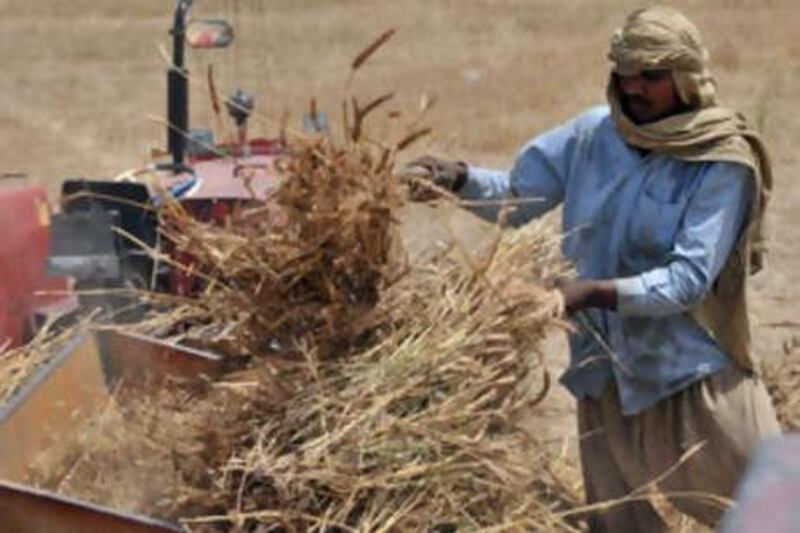DUBAI // Talks aimed at acquiring large agricultural plots of land in Pakistan were not expected to yield results any time soon, a senior Pakistani government official has said. The spectre of the rising price of basic food items has forced the Government to consider buying land in Pakistan, leading to exploratory negotiations between the UAE's Ministry of the Economy and Pakistan's Board of Investment and ministry of food agriculture.
Owning direct food sources in countries such as Pakistan and importing cheaper staples is one way to fight an inflation level of 11 per cent and cut it by half before the end of the year. The point of contention, according to Pakistani officials, is the guarantees sought by the Government to exempt its investors from Pakistani export policies. However, Pakistan, which is fighting its own food-shortage battle, which has caused rioting in the streets and a more than 100 per cent increase in staples such as rice, has not been willing to give written guarantees.
"We know the proposals are on the ground from the UAE Government," said Abdul Rauf, the head of the Pakistan Agricultural Policy Institute "But it may or may not be considered by Pakistan." Another senior official who is close to the ongoing deliberations said Pakistan was willing to give exemptions in the proposed agricultural free zones but a "blanket exemption" was not possible. "I doubt if Pakistan can allow a blanket exemption to all exports by the UAE investors," the official said. "We have to maintain our own basket of food and per-acre yield is already low in Pakistan according to international standards.
"Right now we are sharing ideas and weighing different proposals. But a government-to-government agreement is still far away." Reports of investors buying more than 323,740 hectares of land in Pakistan were not accurate, said the official, because the government had so far received only commitments - and no actual investments - from the Gulf. "So far, there are no UAE Government land holdings in Pakistan. We will consider it as government land holdings if investment arms like Adia or Mubadala directly buy land," the official said.
There were approximately 60,700 hectares of land held by "high net worth individuals" from various emirates, but they were for personal consumption and not necessarily agricultural use, said the official. Abu Dhabi Group, the single largest foreign direct investor in Pakistan, Emirates Investment Group and Abraaj Capital, a Dubai-based investment firm, have all expressed interest in Pakistan's agricultural sector.
From the Gulf, Qatar Livestock Company has committed US$1 billion (Dh3.67bn) to corporate farms in Pakistan, while some Saudi Arabian companies, such as the Al Rabie Group, have also shown interest. "Abu Dhabi Group, EIG and others are all interested, but there is no mechanism [for talks between the two governments] on an official level as yet," he said. The official added that private investors could act on behalf of the Government to procure cheaper food items, and Pakistani authorities could, in turn, facilitate their investments. Last month, Sayed Naveed Qamar, Pakistan's minister for investments, said the government was introducing tax exemptions, duty free import of equipment and 100 per cent land ownership in specialised free zones in its agriculture, livestock and dairy sectors to lure potential investors.
Punjab, the largest agriculture-producing province in the country, has already set aside 4,046 hectares of prime land for the proposed free zones, while provincial governments in Sindh and Balochistan are also coming up with similar land offers for foreign investors. The Independent Jammu and Kashmir have invited foreign investments in tea plantations. "Land is a provincial subject and the federal government and Board of Investment is waiting for the respective governments to come up with their offerings before agricultural free zones could be set up," the official added.
The GCC as a trade block imports the bulk of the Pakistani agricultural exports. The Gulf countries rely heavily on imported food, with the UAE importing almost 85 per cent of its supplies for an estimated Dh11bn annually. By acquiring large plots of land in Pakistan, the Government could import food for 20 to 25 per cent less, said a Pakistani government official. There are six parties in the chain between the farmer and the time the product reaches retailers. By eliminating several of these steps, the Government can procure much cheaper food directly from the farm.






